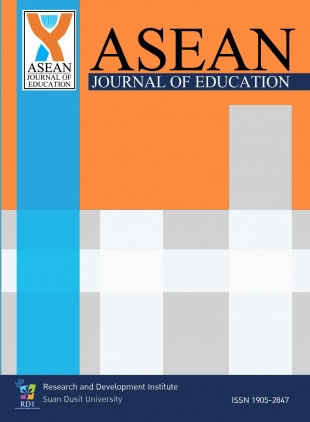Developing Research Awareness by Using Research and Community- Based Learning for Information Science Program’s Students
Keywords:
Research awareness, Communitybased problems, Research and community-based learning, Information scienceAbstract
The objectives of this research were 1) to develop research awareness of students in Library and Information Science program by using research and community- based learning. 2) To test research awareness before and after study with research and community- based learning of students in Library and Information Science. And 3) to study the satisfaction of learning process of research and community- based learning. The sample used for the experimental group consisted of 22 undergraduate students in the Basic Research in Library and Information Science course in the 2019 academic year, Library and Information Science Program. Sample acquisition by selecting a specific sample group. The research instruments were 1) learning management plans by using research and community-based learning, 2) observation form of learning activities, 3) research awareness questionnaire and 4) satisfaction questionnaire of research and community-based learning. The data obtained were analyzed using mean (μ), standard deviation (σ) and content analysis. The results of the study were as follows: The instructional by using research and community-based learning consisted of 5 steps were 1) Prepare for learning, 2) Learning strategies, 3) Research process, 4) Reflect knowledge and 5) Assess learning. The result of the analysis of the research awareness of the experimental group, before the experiment, it was found that the overall research awareness of the sample had sometimes research awareness when evaluating after the experiment was every time research awareness. When separated on each side, the aspect of research awareness at every time was the responding to research, the characterization of research and Understanding, perception of research, while the research value and research value management system were regular research awareness. The satisfaction of the learning process through the research and community-based learning was at medium level.
References
Chatsuriyawong, S. (2014). The paradigm of community based learning for enhancing critical thinking and creative problem solving abilities for elementary school students. (Master of Education Program in Curriculum and Instruction, Silpakorn University). Silpakorn University database.
Furco, A., & Holland, B. (2004). Institutionalizing servicelearning in higher education: Issues and strategies for chief academic officers, public work, and the academy. Bolten, MA: Anker.
Intun, S. (2013). The study of academic achievements by research-based learning method for the students enrolling in CI 2301: Principle of learning management. Chiang Mai: Faculty of Education, Chiang Mai Rajabhat University.
Kammanee, T. (2019). The science of teaching knowledge for effective learning process management. (23rd eds.). Bangkok: Chulalongkorn University Press.
Khamdit, S. (2014). Research-based learning (RBL) in higher education. Suthiparithat, 28(85), 9-21.
Mcllrath, L., & McDonnell, C. (2018). Community-based learning. Retrieved 2018, July 7, from http://www.campusengage.ie/userfiles/files/Community
Paweenbampen, P. (2017). Research-based learning. CMU Journal of Education, 1(2), 62-71.
Petrak, S. (2016). The undergraduate students’ development by research-based real experience course LG2209202 economy of local community. Rajapark Journal, 10(19), 25-34.
Phetkliang, F. (2019). The effects of the use of research–based learning model in a course of education for sustainable development. Retrieved 2019, April 6, from http://www.bsru.ac.th/identity/archives/345
Reungdam, S. (2017). The effects of Integrating the concept of contemplative education, coaching and mentoring and research-based learning to change teaching behavior and development of teaching competency of teacher students in Thai language major. Narkbhutparitat Journal Nakhon Si Thammarat Rajabhat University, 10(Special Issue), 15-25.
Sinlarat, P. (2012). Principles and techniques of teaching in higher education. Bangkok: Dhurakij Pundit University.
Suwannoi, P., Neelayothin, A., Arunmala, P., Lonlua, N. Suksen, A., & Subhakicco, S. (2016). The study of creative leadership of elementary school principals in khon kaen primary educational service area office. International Journal of Current research, 8(4), 29934-2993.
Tammachart, J. (2009). A research and development of research-based learning management model in the educational research course. Pattani: Pattani campus Research Fund.
Terry, A. W. (2000). A case study of community action service learning on young, gifted adolescents and their community. (Doctoral dissertation, University of Georgia). Unomaha.edu database.
Watcharathamrongkul, K. (2009). A construction of a test on global warming effect awareness for the fourth-Level students in Bankok education office area 1. (Master of Education Measurement Srinakharinwirot University). Srinakharinwirot University database.
Wichadee, S. (2011). Education in a new paradigm: Researchbased learning. Executive journal, 31(3), 26-30.
Wolfson, L., & John, W. (1997). What service learning can learn from situated learning: Proposal for a research framework. Retrived 2019, 7 June, from http://www.knowarch.com/index/front_office/evaluation/situat.html
Downloads
Published
How to Cite
Issue
Section
License

This work is licensed under a Creative Commons Attribution-NonCommercial-NoDerivatives 4.0 International License.
1 All articles will undergo a formal peer-review. A panel of experts from within or without the university will examine the article; approval from a minimum of two experts is required for publication. Revisions posed by the experts must be completed by the research prior to publication.
2 Once published in the ASEAN Journal of Education, the article becomes intellectual property of Suan Dusit University. Duplication, in full or part, requires permission from Suan Dusit University.
3 Excluding errors incurred during printing, author(s) are responsible for the content of their articles.






